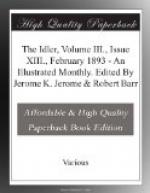[Illustration: MISS BRADDON’S INKSTAND.]
* * * * *
NOVEL NOTES.
BY JEROME K. JEROME.
ILLUSTRATIONS BY J. GUeLICH AND J. GREIG,
PART X.
[Illustration: “DISCUSSION AT OUR LAST MEETING.”]
The final question discussed at our last meeting had been: What shall our hero be? MacShaugnassy had suggested an author, with a critic for the villain. Brown’s fancy was an artist. My idea was a stockbroker, with an undercurrent of romance in his nature. Said Jephson, who has a practical mind, approaching at times the commercial: “The question is not what we like, but what the female novel-reader likes.”
“That is so,” agreed MacShaugnassy. “I propose that we collect feminine opinion upon this point. I will write to my aunt, and get from her the old lady’s view. You,” he said, turning to me, “can put the case to your wife, and get the young lady’s ideal. Let Brown write to his sister at Newnham, and find out whom the intellectual maiden favours, while Jephson can learn from Miss Medbury what is most attractive to the common-sensed girl.”
This plan we had adopted, and the result was now under consideration. MacShaugnassy opened the proceedings by reading his aunt’s letter. Wrote the old lady:
“I think, if I were you, my dear boy, I should choose a soldier. You know your poor grandfather, who ran away to America with that wicked Mrs. Featherly, the banker’s wife, was a soldier, and so was your poor cousin Robert, who lost eight thousand pounds at Monte Carlo. I have always felt singularly drawn towards soldiers, even as a girl; though your poor dear uncle could not bear them. You will find many allusions to soldiers and men of war in the Old Testament (see Jer. 48,14). Of course one does not like to think of their fighting and killing each other, but then they do not seem to do much of that sort of thing nowadays.”
“So much for the old lady,” said MacShaugnassy, as he folded up the letter and returned it to his pocket. “What says culture?”
[Illustration: BROWN READ AS FOLLOWS.]
Brown produced from his cigar-case a letter addressed in a bold round hand, and read as follows:
“What a curious coincidence! A few of us were discussing this very subject last night in Millicent Hightopper’s rooms, and I may tell you at once that our decision was unanimous in favour of soldiers. You see, my dear Selkirk, in human nature the attraction is towards the opposite. To a milliner’s apprentice a poet would no doubt be satisfying; to a woman of intelligence he would be an unutterable bore. The man of brain is not for the woman of brain. What the intellectual woman requires in man is not something to argue with, but something to look at. To an empty-headed woman I can imagine the soldier




